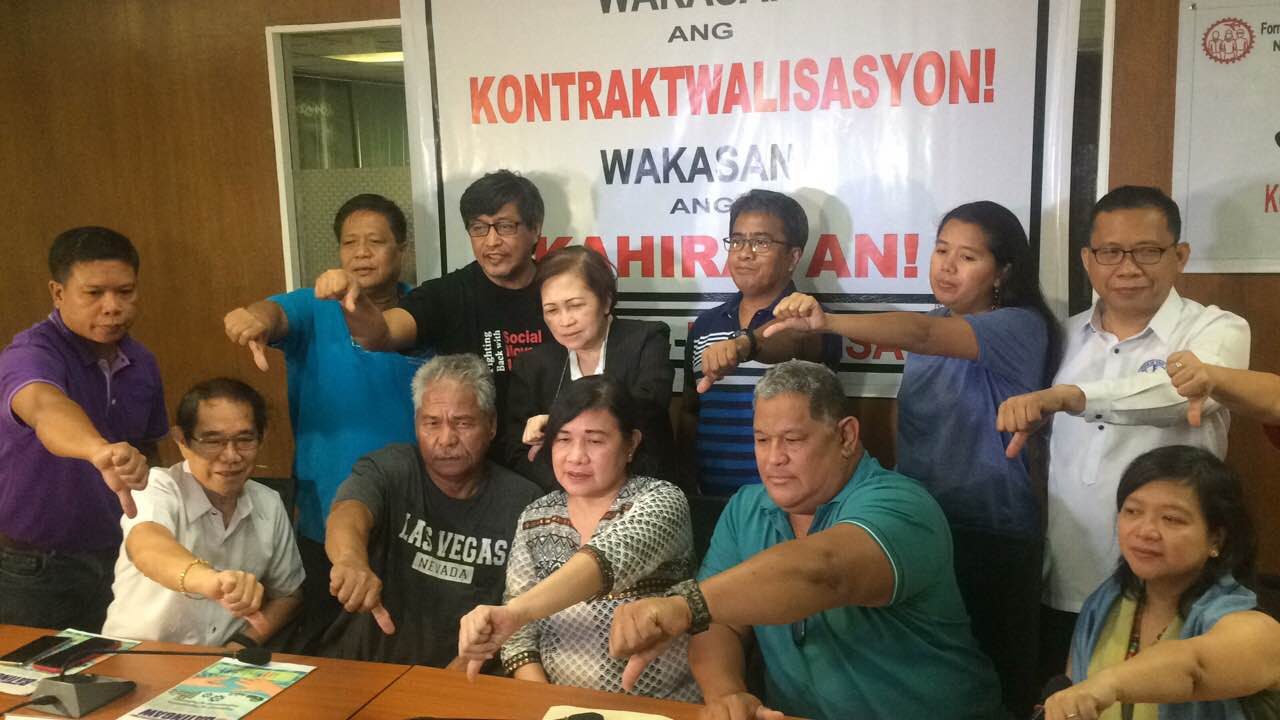SUMMARY
This is AI generated summarization, which may have errors. For context, always refer to the full article.

MANILA, Philippines – Moderate and militant labor groups on Thursday, April 27, set aside their differences to form a united front against contractualization ahead of the celebration of Labor Day on May 1.
Moderate labor coalition Nagkaisa and the militant Kilusang Mayo Uno (KMU), with the National Anti-Poverty Commission, have drafted an executive order as an alternative to Labor Secretary Silvestre Bello III’s Department Order 174 (DO 174), which sets out stricter guidelines on hiring of workers through an agency. (READ: Keeping ‘endo’ alive: DOLE’s Department Order No. 174)
NAPC will help them present their proposed EO to President Rodrigo Duterte during the NAPC en banc meeting next month.
“Dito sa executive order na pinopropose ng NAPC, KMU, Nagkaisa labor coalition ay iprohibit ang all forms of contractualization,” Edwin Bustillos, NAPC Formal Labor and Migrant Workers convenor, said in a news briefing on Wednesday.
(The executive order proposed by NAPC, KMU, and Nagkaisa labor coalition prohibits all forms of contractualization.)
“Panawagan sa executive order na ito ay i-apply sa lahat ng contracting and subcontracting arrangements, kasama na ang mga labor cooperatives engaging sa subcontracting and contracting (This executive order seeks to apply this on all contracting and subcontracting arrangements, including all cooperatives engaging in subcontracting and contracting),” Bustillos added.
Hopeful
“With all other labor federations, with NAPC, with KMU – we strongly advise the President, with due respect, if possible, this coming Labor Day, almost one year [since the elections], if possible, he stays true to his promise to end contractualization,” said Nagkaisa labor coalition chairperson Michael Mendoza.
KMU is hopeful that with NAPC’s intervention, Duterte will approve the draft EO.
“Sa en banc meeting ng NAPC, maipapahayag natin kay Pangulong Duterte iyong masugid na pagnanais ng mga mangagagawa na wakasan na ang eskemang kontraktwalisasyon,” said Roger Solita of KMU.
(In the NAPC en banc meeting, we will be able to tell President Duterte our fervent desire to end the scheme of contractualization.)
The draft EO will be presented to Duterte at the NAPC en banc meeting on May 15, which Bello is expected to attend. The President chairs the NAPC.
NAPC Lead Convenor Liza Maza said it is within her agency’s mandate to propose policies that seek to reduce poverty.
“The President has authority and power to issue executive orders. The problem is the order released by Secretary Bello did not come as favorable and responsive to the laborers that’s why the laborers are now requesting the President to draft a measure himself,” Maza said in Filipino.
DO 174
The labor unions reiterated that the Labor Code of the Philippines does not only empower the labor secretary to regulate contractual employment, but also to completely prohibit it.
Bello had earlier stood firm that DOLE only has the power to set guidelines for contracting out of labor, which has legal forms under Articles 106 to 109 of the Labor Code.
Duterte told labor groups he was against agency-hiring in a Palace meeting on February 27. Since then, the labor groups had accused Bello of defying the President when the labor chief signed the directive that simply regulates labor contracting.
DOLE’s statistics show that there are 670,000 contractual workers hired through a manpower agency.
Bello recently reported that 45,000 contractual workers have been regularized since DOLE started its campaign, but these are only those directly hired by their employers or in bilateral arrangements. The total number of contractual workers under a bilateral arrangement is at 1.3 million. (READ: No ‘endo’ in 2017? Challenge of ending labor contractualization)
The Civil Service Commission put the number of public sector workers at around 1.3 million in 2015. Philippine Government Employees Association president Espie Ocampo said as much as 80% of the public sector work force are under contractual arrangements.
Contractualization will be the top issue to be discussed in Duterte’s dialogue with labor groups in Davao City on May 1, where he is expected to announce a “surprise” for the sector. – Rappler.com
Add a comment
How does this make you feel?
There are no comments yet. Add your comment to start the conversation.